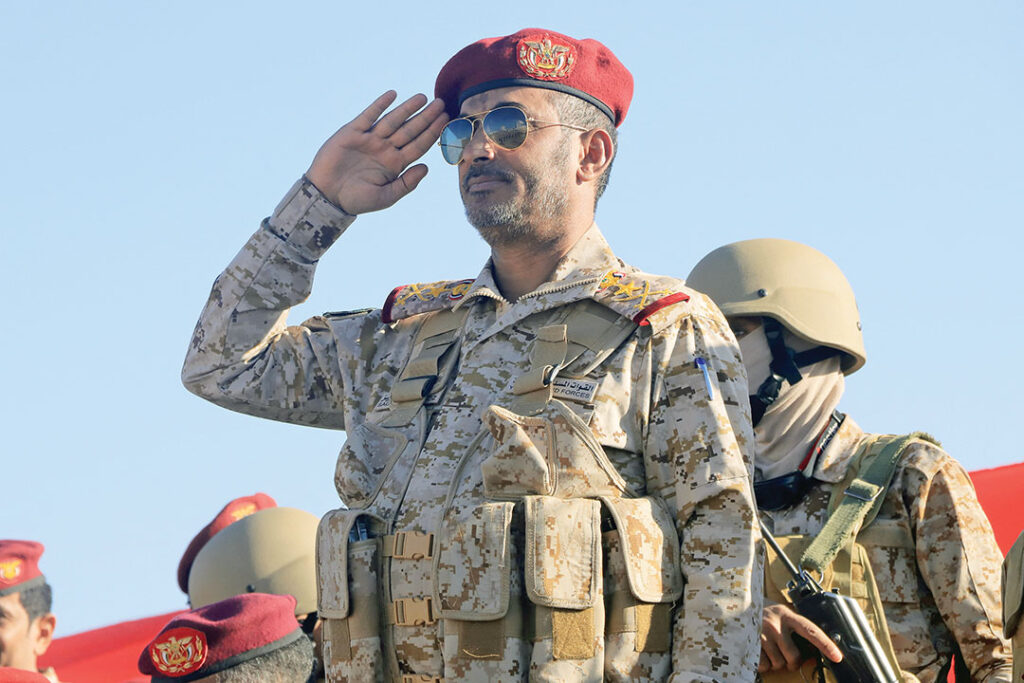I would like to express my gratitude and appreciation to United States Central Command for publishing this issue of Unipath magazine that addresses the need for confronting violent terrorist organizations.
The Yemeni state was aware of the danger of the Houthi terrorist organization early on and confronted it 20 years ago.
The battles continue to this day.
The group was able to expand the scope of its rebellion until it toppled the government and took control of the capital Sanaa and other Yemeni cities in 2014 by taking advantage of the fragility of the political system and unlimited support from Iran.
The fight between the Yemeni people and the group turned into a full-fledged confrontation led by the legitimate government, the Armed Forces and local resistance groups with support from the legitimacy-seeking alliance created by Saudi Arabia in March 2015. This resulted in the liberation of a significant amount of territory. Unfortunately, external forces and a lackluster reaction from the international community played into the hands of the Houthis.
Nevertheless, the Houthis have failed to subjugate a majority of the Indigenous Yemeni people despite killings and excessive repression. The Houthis aim to strike at the doctrine, identity, thought, culture and heritage of Yemen. But the Yemeni people have resisted and fought to regain their rights, freedoms and their state despite the suffering and sacrifices they have endured. However, the Yemeni people feel isolated in this legitimate battle. They believe that an “indulgent” international community has enabled the Houthis to expand their terrorist operations beyond Yemen until the Houthis are now threatening Arab national security and regional and global security. They are targeting airports, ports, and oil and gas production facilities within Yemen and neighboring countries.
The Houthis present a greater danger to global security and peace than other terrorist organizations such as al-Qaida and Daesh because they have taken control of elements of the Yemeni state and some of the capabilities and weapons of its Armed Forces. Furthermore, they now possess an arsenal supplied by Iran’s military industry, including ballistic and winged missiles, drones, and small unmanned boats and ships.
This group is moving to execute its Iranian plan as an integrated organization and is operating openly and visibly. It is not operating like other violent and extremist groups that form small cells that loiter and blend into the countryside and communities and carry out surprise attacks and guerrilla warfare, and rely on individual recruitment.
What is even more dangerous is that the group is working to entrench its project and is preparing for long-term wars by recruiting a generation of sectarian fighters and followers, instilling sectarian divisions in society, and securing strategic sources of permanent funding.
We regret to say that the Houthis have been able to develop their military capabilities through Iran’s continued violations of international law and United Nations Security Council resolutions and its illicit supplies of weapons and military technology to its Houthi militia, supporting it with money, intelligence, publicity and propaganda.
Iran’s war in Yemen escalated during the war in Gaza. Iran has made its position clear by further mobilizing its Houthi militias and other proxies in the region. It has focused its military efforts on threatening international shipping lanes and has intensified terrorist activities carried out by the Houthis in the Red Sea, the Gulf of Aden and as far away as the Arabian Sea. Control of the Bab el Mandeb Strait, one of the most important routes for global shipping, is a key objective for Iran and a strategic threat to global security.
The Houthis are exploiting popular sentiment toward the Gaza war to mobilize and propagate hatred under the guise of supporting the people of Gaza.
The Iranian-Houthi threat cannot be confronted simply by naval military alliances, because it is primarily a land problem and terrorist strikes are being carried out from rebel-held territories. Naval and airstrikes achieve some goals and curb some of the Houthis’ capabilities, but they will not accomplish the goal of destroying Houthi capabilities and deterring their hostile operations.
Yemenis believe the solution lies in supporting the legitimate Yemeni government, helping it retake control of the state, liberate territories and crush the Houthi forces. This will help establish security and stability, secure global shipping, and bring about lasting peace and security to Yemen. We must also not ignore the alliances that are being formed for the benefit of the Yemeni people and their internationally recognized state.
We, the Yemeni Armed Forces, appreciate the position of the United States in supporting the legitimate government and the cooperation and assistance provided to our Yemeni army, as well as the efforts of the U.S. Navy and combined forces in combating the smuggling of weapons and drugs from Iran and preventing them from reaching the Houthis.
We look forward to more support for our Armed Forces and developing their capabilities and readiness in carrying out their duties so that they may become an effective partner in enhancing maritime security and combating terrorism. Our naval and coast guard units and our border security forces are carrying out major tasks in their fields of operation, but need weapons, equipment, training, and enhanced operational support and intelligence.
We are counting on the support of our partners, brothers and friends to restore peace to our country and deter the threats from Iran and its proxies. The stability of the region is contingent upon the stability of Yemen.
Lt. Gen. Dr. Sagheer bin Aziz, Chief of the General Staff and Commander of Joint Operations, Republic of Yemen

